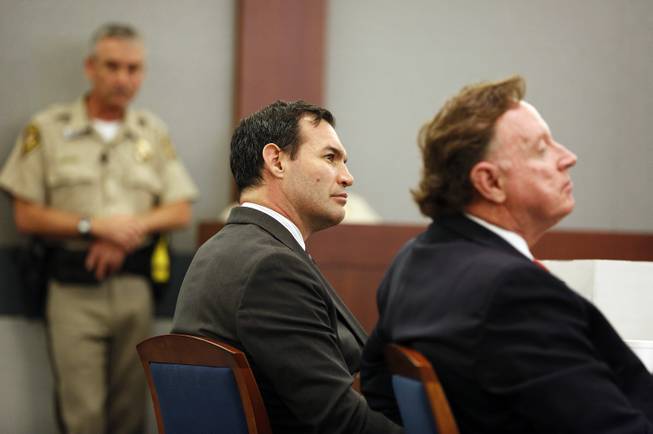
John Locher / AP
George Tiaffay, center, appears in court with his attorney Robert Langford, right, Tuesday, Aug. 25, 2015, in Las Vegas. Tiaffay is accused of hiring a homeless man to kill his wife Shauna Tiaffay nearly three years ago.
Tuesday, Aug. 25, 2015 | 5:12 p.m.
A prosecutor alleged Tuesday that George Miguel Tiaffay befriended, supplied and promised to pay a homeless handyman who bludgeoned his casino cocktail server wife to death with a claw hammer a few weeks after the couple filed for divorce.
Tiaffay's defense lawyer contended that the homeless man, Noel Scott Stevens, can't be believed and that Tiaffay — a West Point graduate and former Las Vegas firefighter — was being wrongly prosecuted on murder, conspiracy and other charges.
"It's a good story," defense attorney Robert Langford told a Clark County District Court jury after prosecutor Marc DiGiacomo outlined what he termed a trail of manipulation, deception and circumstantial evidence pointing to Tiaffay's guilt in the slaying nearly three years ago.
"If you put it all together just the right way, that's what you get," Langford conceded. "But there's a lot of reason not to put it together that way."
DiGiacomo conceded that Tiaffay didn't commit the murder himself. He was at work when the 46-year-old mother of their 8-year-old daughter was attacked and killed as she returned home about 3:30 a.m. from a night shift at the Palms Casino Hotel.
But police found that Tiaffay telephoned Stevens 87 times in the month before the slaying — almost as many times as the wife who'd told him their relationship was over and that they should continue to live separately.
Bloody jeans with DNA matching Stevens and Shauna Tiaffay were found near one of Stevens' tents. A key to her apartment was stashed in a Goodwill donation shed by a friend of Stevens. A tag to a 1-pound hammer like the murder weapon was found in another of Stevens' desert homeless encampments.
The jury saw store video showing Tiaffay and Stevens together buying dark clothes at a Walmart, and a hammer, knife and gloves at another store several weeks before the slaying.
Cellphone tower data traced Stevens' movements between his campsites, the Palms Casino and the homes of George Tiaffay and Shauna Tiaffay, DiGiacomo said.
"Layer upon layer" of evidence piled up, the prosecutor said, "until the entire scheme unraveled."
DiGiacomo noted that as police grew closer to questioning George Tiaffay in the days following his wife's death, he crashed his Ford F-150 pickup at more than 80 mph into concrete retaining wall. There were no skid marks. Tiaffay was injured but recovered to be charged in the slaying.
Langford said the only thing certain is that Stevens killed Shauna Tiaffay.
The defense attorney said he'll provide for the jury reasonable doubt that George Tiaffay was involved. He hasn't said whether Tiaffay will testify.
Stevens, 40, pleaded guilty in January 2013 to charges including murder and conspiracy, and awaits sentencing. He is expected to face 20 years to life in state prison.
He could also be a star witness for the prosecution.
Tiaffay, 43, has pleaded not guilty to similar charges. He could face life in prison.
Stevens told police that Tiaffay provided a key to Shauna Tiaffay's apartment where he told a grand jury he hit her 17 times with a hammer. DiGiacomo told the jury the hammer broke during the attack.
A crime scene analyst testified that the right side of Shauna Tiaffay's head was severely damaged, and that she had broken fingers on her right hand. Police said the hand injuries appeared to be defensive wounds.
Tiaffay had his daughter with him when he arrived at Shauna Tiaffay's apartment early Sept. 29, 2012, and found the bloody murder scene, according to a 911 call played in court on Tuesday.
That same day, Stevens, who went by the name Greyhound, bragged about the slaying to someone who contacted police, DiGiacomo said.
Stevens made $600 by having a friend pawn Shauna Tiaffay's engagement ring, the prosecutor said, and told various people he'd been promised thousands of dollars for her killing. He told one man the amount was $20,000.
Langford derided Stevens' accounts, saying that the co-defendant told other people he was a crime family hitman who'd been paid $40,000, $50,000 or $60,000 to kill someone at the Palms Casino. But he still lived in a homeless camp in the desert outside Las Vegas.

Join the Discussion:
Check this out for a full explanation of our conversion to the LiveFyre commenting system and instructions on how to sign up for an account.
Full comments policy